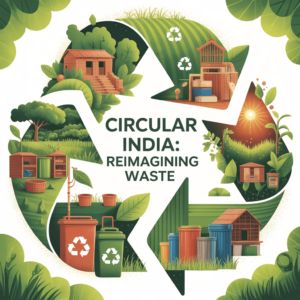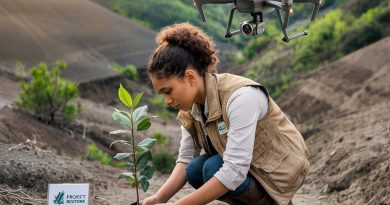Waste to Wealth Startups in India: Real Success Stories of Circular Innovation
Introduction
India, home to over 1.4 billion people, produces around 62 million tonnes of waste every year, with only 20% of that actually being processed. While this figure can seem daunting, it also opens the door to an exciting opportunity: turning waste into wealth. The “waste to wealth” trend is picking up speed in India, fueled by more awareness about sustainability, government support, and a wave of innovative startups.
At the center of this change is the circular economy, a model focused on reducing waste and making the most of resources. Indian startups are rethinking waste, seeing it as a valuable resource instead of a problem. These green companies are creating eco-friendly products and services, while also promoting economic growth and caring for the environment.
Through this blog, we’ll look at inspiring success stories of circular innovation in India. We’ll see how these startups tackle environmental issues while building successful businesses, and how anyone can contribute to a greener future.
Understanding the Circular Economy in India

The circular economy focuses on reducing waste by continuously reusing resources through methods like recycling and refurbishment. Unlike the old “take-make-dispose” model, this approach mimics nature, where nothing goes to waste.
In India, the circular economy isn’t just good for the environment; it’s also crucial for the economy. A 2020 report noted that moving to a circular economy could add around ₹14 lakh crore (about USD 218 billion) and create millions of jobs by 2030.
Key sectors identified for circular transformation include:
Agriculture (biowaste to compost)
Textiles (recycling fabrics)
E-waste (recovering precious metals)
Construction (reusing debris)
Plastic and packaging
India’s rich tradition of reuse — from reusing glass bottles to repurposing old clothes — makes it fertile ground for circular innovation. Government policies like the Swachh Bharat Mission and Extended Producer Responsibility (EPR) frameworks have further fueled the growth of circular practices.
Yet, it is the startup ecosystem that has emerged as the true game-changer, leveraging technology, local insights, and sustainable business models to turn the waste problem into a wealth opportunity.
Real Success Stories of Waste to Wealth Startups in India
1. Banyan Nation – Recycling Plastic, Rebuilding Trust
Location: Hyderabad
Founded: 2013
Focus: Post-consumer plastic recycling
Banyan Nation is redefining how India looks at plastic. It uses data intelligence and proprietary cleaning technology to convert discarded plastic waste into high-quality recycled granules that match virgin plastic standards.
Impact: Their recycled plastic is used by top-tier clients such as Unilever, Reckitt, and Shell.
Mission: “To restore trust in recycled plastics through technology and transparency.”
Recognition: Winner of the Dell Circular Economy People’s Choice Award at the World Economic Forum, 2018.
Banyan Nation not only reduces plastic pollution but also integrates informal waste pickers into its supply chain, improving livelihoods and promoting inclusive circularity.
2. Graviky Labs – Turning Pollution into Ink
Location: Bengaluru
Founded: 2016
Focus: Capturing air pollution and turning it into art supplies
Graviky Labs is behind the revolutionary AIR-INK technology — a method of capturing soot from vehicular and industrial pollution and converting it into safe, usable ink for artists and printers.
Innovation: Each 30ml of AIR-INK contains soot from 45 minutes of car pollution.
Clients: Collaborated with brands like Tiger Beer and Absolut for sustainability campaigns.
Awards: MIT Technology Review’s Innovators Under 35 and UNEP Champions of the Earth nomination.
By combining environmental science and design thinking, Graviky Labs has created a circular loop from pollution to creativity — a true “waste to wealth” story.
3. EcoRight – Sustainable Fashion from Waste
Location: Ahmedabad
Founded: 2017
Focus: Eco-conscious accessories and bags from waste materials
EcoRight creates fashionable tote bags, backpacks, and pouches using recycled plastic, discarded cotton, and sustainable dyes.
Sustainability Stats: Each EcoRight bag prevents 5–10 plastic bottles from reaching landfills.
Global Reach: Ships to over 60 countries via platforms like Amazon and Flipkart.
Ethical Manufacturing: Partners with SA8000-certified facilities for fair labor practices.
EcoRight proves that sustainability and style can coexist — offering a circular solution that appeals to conscious consumers across the globe.
4. GAIA GRID – Bio Enzymes from Kitchen Waste
Location: Mumbai
Founded: 2018
Focus: Organic cleaning products made from fruit peels and food waste
GAIAGRID collects fruit peels from juice vendors and households, fermenting them into powerful bioenzymes used for cleaning, gardening, and wastewater treatment.
Circular Benefits: Reduces chemical pollution and food waste simultaneously.
Community-Centric: Offers workshops and DIY kits to promote low-waste living.
Zero-Waste Operations: Packaging made from upcycled and compostable materials.
The brand’s vision is aligned with everyday sustainability — making eco-friendly solutions affordable and accessible to urban households.
5. Recykal – Digitalizing the Circular Economy
Location: Hyderabad
Founded: 2016
Focus: Tech-enabled waste commerce
Recykal is a cloud-based platform connecting waste generators (like businesses and households) with recyclers and processors in real-time.
Impact: Diverted over 300,000 metric tonnes of waste from landfills since inception.
Clients: Works with Amazon, Coca-Cola, and Infosys to fulfill EPR mandates.
Innovation: Offers real-time waste tracking, transparency in material flow, and data-driven insights.
By integrating blockchain and IoT, Recykal is creating a transparent and scalable digital infrastructure for India’s circular economy.
Impact on Communities and Environment
The rise of circular startups in India is not only a win for sustainability — it’s transforming lives and ecosystems.
Environmental Impact:
Reduction in Landfill Waste: Startups like Recykal and Banyan Nation have prevented hundreds of thousands of tonnes of plastic and e-waste from ending up in landfills.
Cleaner Air and Water: Innovations like AIR-INK and bioenzymes reduce urban pollution and chemical runoff, contributing to improved air and water quality.
Resource Efficiency: By using waste as a resource, these companies reduce the need for virgin materials, helping conserve energy, water, and biodiversity.
Community Impact:
Job Creation: Startups are employing local youth, artisans, and informal waste workers, providing dignified livelihoods and skill development.
Awareness and Education: Brands like GAIAGRID are educating consumers on composting, zero-waste practices, and the circular lifestyle.
Inclusive Growth: By working with marginalized groups and promoting women-led enterprises, these startups are building socially responsible supply chains.
In essence, the waste to wealth model creates a ripple effect — generating economic opportunities while addressing urgent ecological challenges.
How Individuals and Businesses Can Contribute
Circular innovation isn’t just for startups — everyone has a role in driving the waste to wealth revolution.
For Individuals:
Segregate Waste: Start with proper disposal — separate organic, recyclable, and hazardous waste.
Support Sustainable Brands: Choose products made from recycled or upcycled materials.
DIY & Composting: Convert kitchen waste into compost or cleaning enzymes at home.
Educate & Advocate: Spread awareness in your community and support zero-waste initiatives.
For Businesses:
Implement EPR Practices: Align with platforms like Recykal to fulfill Extended Producer Responsibility obligations.
Reduce Single-Use Plastics: Switch to compostable or reusable alternatives for packaging.
Green Procurement: Source products and raw materials from certified circular vendors.
Engage Employees: Run sustainability workshops and employee-led recycling programs.
Frame Innovative encourages businesses to take bold steps toward responsible production and conscious consumption. Through partnerships, education, and innovation, both individuals and corporations can be the catalysts of a cleaner, more equitable economy.
Conclusion: Transforming Trash into Triumph with Frame Innovative
India’s journey from waste to wealth is powered by visionary startups that combine sustainability, technology, and social good. These success stories demonstrate that circular innovation is not only viable — it’s essential for a resilient and inclusive future.
By repurposing waste into valuable resources, startups like Banyan Nation, Graviky Labs, EcoRight, GAIAGRID, and Recykal are redefining progress in the 21st century. Their work aligns perfectly with the mission of Frame Innovative — to empower businesses and individuals to build a world where economic development and environmental stewardship go hand in hand.
Frame Innovative continues to spotlight such changemakers and equip communities with the tools, knowledge, and networks needed to scale circular solutions. Because real change begins with action — and every piece of waste is a hidden opportunity waiting to be unlocked.
Explore more on circular innovation and sustainability at FRAMEINNOVATIVE





great 👍🏼
[…] IoT technology is the backbone of smart bins. It enables real-time monitoring, data collection, and automated alerts, creating a more responsive and efficient waste management system. […]